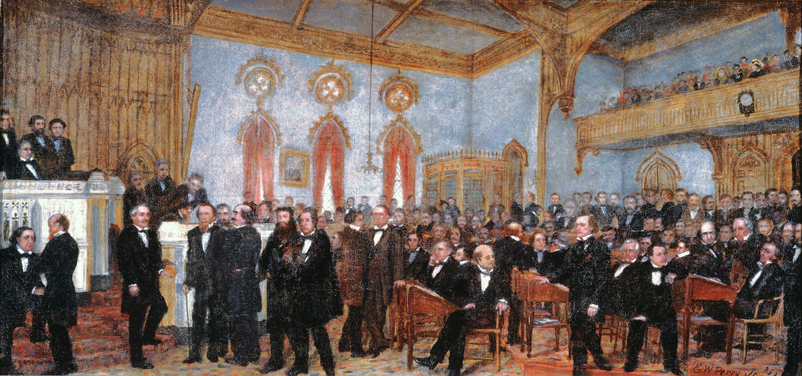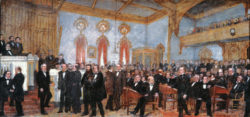Unionism in Louisiana
Contrary to conventional assumptions, many Louisianans opposed secession and the Confederacy during the Civil War.

Courtesy of Louisiana State Museum
Signing the Ordinance of Secession of Louisiana. Perry, Jr., Enoch Wood (Artist)
Contrary to conventional assumptions, many Louisianans opposed secession and the Confederacy during the Civil War and remained loyal to the Union for several reasons, among them: local politics, economic or familial connections to the North, and a strong sense of nationalism. Enslaved African Americans saw their best chance at freedom in Union victory and thus supported the North. The ongoing support for Unionism demonstrated just how divisive secession was among Louisianans.
The Politics of Unionism
On January 26, 1861, Louisiana officially seceded from the Union, becoming the sixth Southern state to break bonds with the US Constitution following Abraham Lincoln’s election as president. Those who supported secession felt that the rights of the South were under attack, first, by Northern abolitionists who wanted to end slavery and, second, by the federal government’s growing power to limit the expansion of slavery into the western territories. Most who desired secession felt that the federal government had deliberately expanded its power to limit a Southern slaveholder’s right to bring slaves into the western territories, and the issue of the expansion of slavery into the territories set off strong emotions in both the North and the South.
Secession advocates had a difficult task in gaining the support of Louisiana’s aristocratic elites, especially sugar planters. These planters had strong social and economic ties to the North and relied heavily on the federal tariff to protect their harvests, particularly from Caribbean sugar producers. Some sugar planters also argued that slavery, where it existed, enjoyed guaranteed constitutional backing, and secession risked ending that protection. But ultimately, secession would have been impossible without the support of this powerful group. What emerged during the secession winter of 1860/1861, then, was a process of debate and eventual concurrence as most of the political opposition to secession withered. Those crying for disunion drowned out the voices that argued for union.
The Election of 1860
The impetus for secession did not receive serious consideration in Louisiana until the presidential election of 1860 offered voters a spectrum of options on the issue. Voters for Stephen A. Douglas (a candidate of the Democratic Party, supported in the northern United States) and John Bell (a former Whig who was a candidate of the Constitutional Union Party) wanted some form of Unionism, while the supporters of John C. Breckinridge (a candidate of the Democratic Party, with supporters in the southern United States) called for secession. The eventual winner of the 1860 election, Abraham Lincoln, never appeared on the ballot in the South, as most Southerners found his positions on free labor in the West reprehensible. Breckinridge secured the state’s six electoral votes but not a majority of the popular vote, having won only 22,681 votes. Bell tallied 20,204 votes, while Douglas pulled in 7,625. In effect, the presidential election served as a referendum on secessionist sentiment in the state, and a majority of voters there did not support secession at that time. Though Breckinridge won the electoral votes, the combined popular votes for Bell and Douglas—those who argued for some form of Unionism—outnumbered the votes for immediate secession.
After Lincoln’s victory, Unionism’s popularity slowly waned over the next several weeks, and it became apparent to the state’s secessionist leaders that compromising with the Republican Lincoln was out of the question. Gov. Thomas Overton Moore called for a special session of the legislature to consider the possibility of secession; on December 10, 1860, the state legislature met and passed a bill calling for the election of delegates to a convention to determine Louisiana’s relationship to the Union.
Factionalism and Violence
Three views on secession dominated, and most voters realized that the choice was not between secession and Unionism, but on the appropriate moment to secede. One view, that of “cooperationists,” desired a united movement coordinated among all of the Southern states. These cooperationists closely aligned themselves with the “conditional Unionists,” who wanted a final effort at compromise with federal authorities and some constitutional guarantee of Southern rights. Those who considered themselves “immediate secessionists” supported Louisiana’s immediate withdrawal from the Union, citing the Lincoln’s election as sufficient provocation. The immediate secessionists won a plurality of votes, receiving 20,448 to the 17,296 votes cast for the cooperationists.
The January 7, 1861, election sent 131 delegates to Baton Rouge to debate Louisiana’s course of action. Of those delegates, fifty identified themselves as some form of cooperationist or conditional Unionist and the rest as immediate secessionists. Seventeen delegates remained staunchly Unionist and sought to stall secession for as long as possible. This small minority, led by James G. Taliaferro of Catahoula, would prove loyal to the federal government throughout the war years. But because of their small numbers, the Unionists could do little to stop the mounting support for secession, and their protests received little consideration. Less than three weeks after the convention assembled, delegates had voted for secession.
A tally of the vote shows pockets of Unionism that survived the war years, and many of those areas had outbreaks of violence as Unionists fought Confederates. In the southeastern Louisiana parishes of Ascension, Assumption, Terrebonne, Jefferson, Plaquemines, and St. Bernard, votes for cooperationist delegates more than doubled those for secessionists. In St. James and St. John the Baptist parishes, cooperationist votes were more than four times the number of votes cast by immediate secessionists. The river parishes experienced less conflict because Union troops occupied them early in the conflict, but geography played a factor, too. The citizens of these parishes remained loyal to the Union for the economic benefits granted by the protective tariff. The largest geographical area of Unionism centered on Caldwell, Catahoula, and Winn Parishes, where cooperationist voters outnumbered secessionists by more than two to one. In this region, violent behavior characterized the relationship between Unionists and Confederates. Though they were far from the stronghold of Unionism in the southern parishes, the Unionists in this part of the state remained staunchly loyal to the United States throughout the war.
Guerrilla Warfare
Aside from politics, most Unionist sympathy was demonstrated on the home front by those whose actions spoke louder than their votes. During the Civil War, Unionist sympathies did not wither in Louisiana but, by necessity, Unionists had to carefully weigh their actions when it came to openly supporting the Union—or risk reprisal from Confederates. Many Unionists did suffer at the hands of their Confederate neighbors. For example, when Gen. Nathaniel Banks’s army withdrew from Alexandria in May 1864, many anti-Confederates suffered the destruction of personal property, had their homes burned, or were killed by Confederate troops. In response, some Unionists formed their own guerrilla units to fight Confederates, protected fellow Unionists, served as scouts for Union forces, and raided Confederate civilians. Called “jayhawkers,” these Louisiana Unionists skirmished with Confederate soldiers and made life difficult for Confederate civilians. One man, Dennis Haynes, actively recruited neighbors and relatives to fight against Confederates, and his memoir offers an exciting tale of the dangers involved in supporting the Union in the Deep South. Though it is difficult to quantify the exact number of jayhawkers and Unionist sympathizers, their presence certainly disrupted the ability of the Confederacy to effectively govern the state.
African Americans and Unionism
Enslaved African Americans comprised the largest body of anti-Confederate sentiment in the state. Whenever Union troops closed in on plantations, many slaves voted with their feet and took off for the protection offered by Union lines. When Gen. Benjamin Butler and his forces captured New Orleans in April 1862, thousands of runaway slaves flooded the city looking for freedom, protection, and work. For Confederates, Butler was an unwelcome invader, but for former slaves he served as an agent of freedom. Butler worked closely with loyalist sugar planters, and he hired thousands of freed slaves out to these planters as wage labor. The workers labored for ten hours a day, six days a week, and earned ten dollars a month. He also mustered three regiments of African American soldiers, called the Native Guards, into the Union army. Though the Native Guards had first been in Confederate service, they had refused to fight against the Union and they served the Union army well. At the siege of Port Hudson in the early summer of 1863, both the First and Third Regiments participated in the attacks on the Confederate works, showing many doubters that black troops could fight just as well as whites. Though highly unpopular among Confederates, Butler’s actions paved the way for later Reconstruction policies in Louisiana.
The Union occupation of New Orleans also allowed for the election of a Unionist Louisiana governor, Michael Hahn—who was voted into office in 1864 after Gen. Nathaniel Banks called for a special gubernatorial election—but a Confederate government operated in exile. After the fall of Baton Rouge, Louisiana’s Confederate government had decamped to Opelousas, then to Shreveport. Hahn served for one year as the Civil War came to a close; during his tenure, he called for a new state constitution that would give freed slaves the vote. His progressive measures were halted, however, when Maj. Gen. Stephen A. Hurlbut took over Banks’s command and proved to be more sympathetic toward white supremacists.
Unionist support in Louisiana spread across every parish and exhibited itself in many forms. Like most other Confederate states, the presence of Unionists undermined Confederate stability locally and underscored the dissatisfaction that many of Louisiana’s citizens had with the Confederacy. Unionist activities took men away from the battlefield in order to police the home front, thereby weakening the Confederate war effort. Although Unionists in Louisiana have generally received less recognition than those in other states, their role in the Civil War was no less significant.
